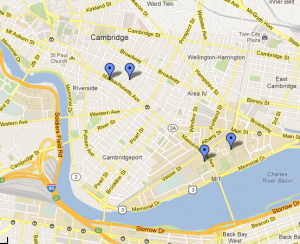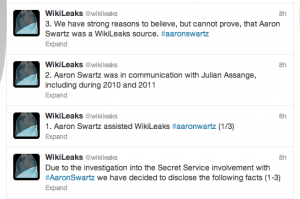[youtube]jQ2cUk8tuTU[/youtube]
As I mentioned earlier, John Cornyn asked Eric Holder whether Aaron Swartz was prosecuted because of his FOIAs.
Second, was the prosecution of Mr. Swartz in any way retaliation for his exercise of his rights as a citizen under the Freedom of Information Act? If so, I recommend that you refer the matter immediately to the Inspector General.
I have shown earlier how, during the period when the Grand Jury was investigating Swartz, Swartz was FOIAing stuff that the prosecutor seems to have subpoeaned as part of a fishing expedition into Swartz. I have also shown that a FOIA response he got in January 2011 suggests he may have been discussed in a (presumably different) grand jury investigation between October 8 and December 10, 2010. And Jason Leopold has also pointed to some interesting coincidences in Swartz’ FOIAs.
But there’s a series of FOIAs Swartz submitted that almost certainly pissed off the government: he FOIAed tapes that would have had Bradley Manning, describing in his own words, how he was being treated at Quantico.
On December 23, 2010, David House blogged about the treatment Bradley Manning was being subjected to at Quantico (which has since been deemed illegal).
On December 27, Swartz asked for the following in FOIA from the Marine Corps:
Any records related to Bradley Manning or his confinement in Quantico Brig.
In particular, please process as quickly as possible a request for the government-curated audio tapes created in Quantico brig visitation room #2 on December 18 and December 19 2010 from 1:00pm – 3:00pm. These tapes may also contain a recording of David M. House; I have permission from David House under the Privacy Act to request these records.
The timeline that ensued is below, with other significant dates included.
Of particular interest? The Secret Service didn’t get warrants to investigate Swartz immediately after his initial arrest, in spite of the fact Secret Service Agent Michael Pickett offered to get a warrant on January 7. In fact, Secret Service didn’t get warrants until February 9, over a month after his initial arrest. (Update: See this post for more on the delay.)
That’s the day Swartz FOIAed the Army Criminal Investigative Service for the tapes on Manning’s treatment.
More odd still, the Secret Service didn’t immediately use the warrants to obtain the hardware seized in his arrest; the warrant to search his hardware expired and Secret Service eventually got a second one. But Secret Service did search Swartz’ home two days after they got that warrant, on February 11–two days after he asked ACIS for the tape that would have Manning describing how he was being treated.
Suffice it to say that Swartz was pursuing the same information that got State Department Spokesperson PJ Crowley fired just as USSS intensified its investigation of him.
While I don’t think Swartz’ pursuit of details on Manning’s treatment would be the only reason they would deal with him so harshly, the Obama Administration clearly was dealing harshly with those who were critical of the treatment of Manning.
Update: This post has been updated for accuracy.
December 23, 2010: David House blogs about Manning’s treatment, effectively fact-checking DOD’s claims.
December 27, 2010: Swartz FOIAs the recording of House’s visit to Manning, which would have captured Manning describing in his own words how he was being treated.
December 29, 2010: Initial response on Manning brig FOIA.
January 4, 2011: MIT finds Swartz’ computer. Secret Service takes over the investigation.
January 6, 2011: Swartz arrested.
January 7, 2011: Twitter administrative subpoena to several WikiLeaks team members revealed.
January 17, 2011: Protest outside of Quantico for Manning.
January 18, 2011: Manning placed on suicide risk.
January 20, 2011: Swartz’ Manning brig FOIA transfered to Quantico CO.
February 1, 2011: Quantico tells Swartz Manning brig FOIA needs to go to Army Criminal Investigative Service.
February 9, 2011: Swartz FOIAs ACIS for Manning brig information.
February 9, 2011: Secret Service obtains warrant to search Swartz’ hardware and apartment, followed by a warrant to search his office.
February 9, 2011: WSJ reports WikiLeaks investigation cannot prove Assange induced Manning to leak documents.
February 11, 2011: Secret Service searches Swartz’ house and office, but not the hardware primarily implicated in the crime purportedly being investigated.
February 22, 2011: Warrants on Swartz’ hardware expire.
February 24, 2011: Secret Service obtains new warrant for hardware. Initial response from ACIS to Manning brig FOIA.
February 28, 2011: ACIS responds to Swartz’ Manning FOIA, stating,
… the requested documents are part of an ongoing Army court-martial litigation and are not releasable to the public at this time. This request will be closed. Please submit your request at a later time.
March 2, 2011: Swartz responds to this rejection:
On the 28th of February, the US Army’s Freedom of Information Act Officer declined to release documents I requested under FOIA/PA because they “are part of an ongoing Army court-martial litigation.”
Being part of ongoing litigation is not a valid exemption to the FOIA or the Privacy Act.
There are narrow exemptions for certain types of release that interfere with law enforcement activities, but the Army has not claimed these exemptions nor explained why they apply. Furthermore, the normal procedure is to collect the documents and then evaluate them to see whether any portions of them qualify for the exemption. It appears the Army did not collect documents in response to my request at all, so I do not see how it could have evaluated them.
I therefore appeal my request in its entirety.
March 3, 2011: ACIS admits Swartz is correct:
You are absolutely correct and I want to apologize for sending you the wrong information. This request is being sent to the Initial Denial Office (IDA) today. Please give them a couple of days to receive it.
March 4, 2011; ACIS sends another letter:
Because this request has been denied this request is being sent to the Initial Denial Office (IDA).
March 11, 2011: PJ Crowley criticizes Manning’s “ridiculous, counterproductive, and stupid” treatment at event at MIT. Jake Tapper asks Obama about Crowley’s comment at press conference.
March 13, 2011: White House forces PJ Crowley to resign for criticizing treatment of Manning.
March 18, 2011: ACIS rejects his request, citing an ongoing investigation.
April 19, 2011: DOD announces Manning will be moved to Leavenworth.


